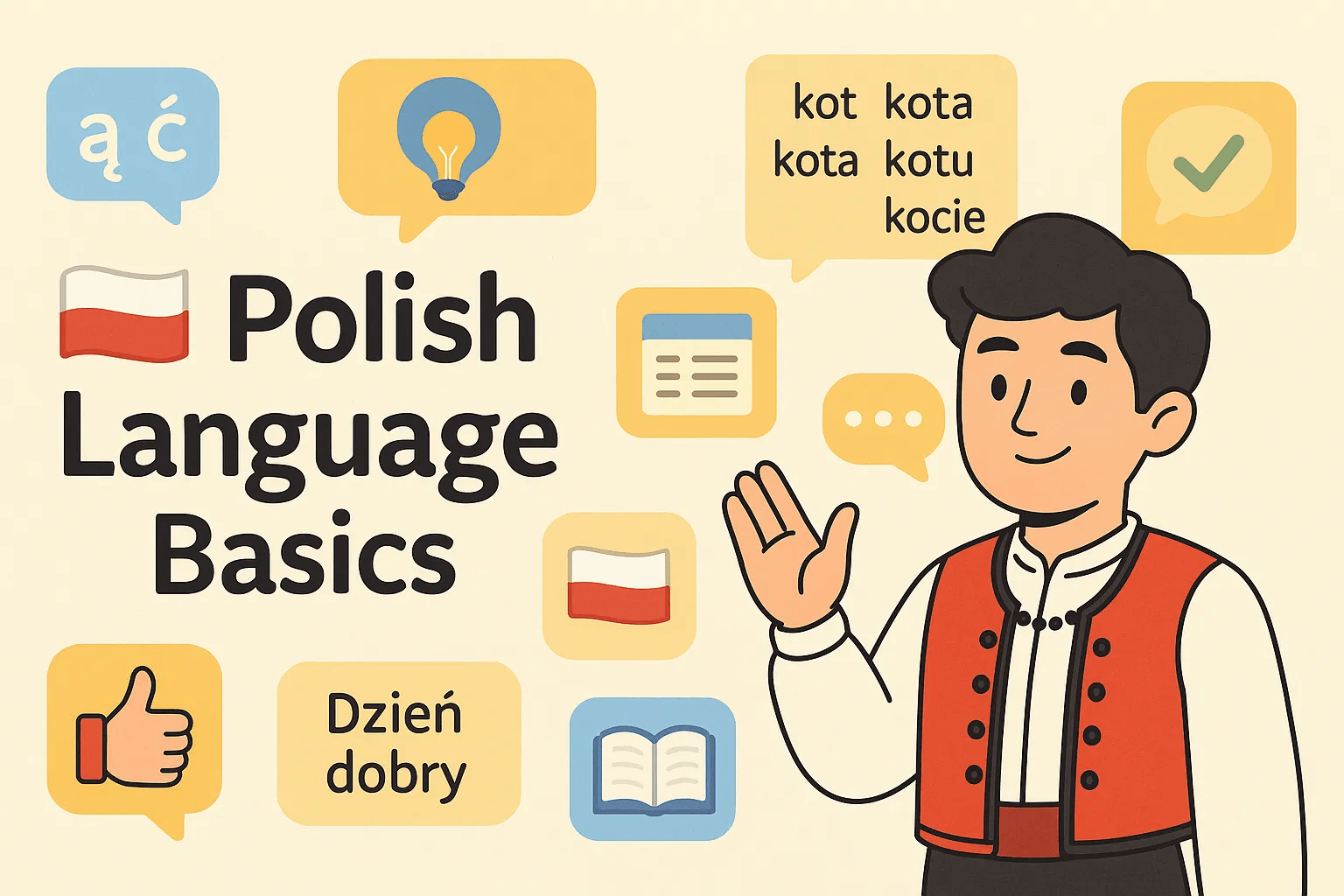Polish Language Basics: Learn to Speak with Confidence

Table of Contents
- Why Learn Polish?
- Polish Alphabet & Pronunciation
- Polish Grammar Basics
- Must-Know Polish Phrases
- Common Challenges
- Best Tools to Learn Polish
- Final Tips
🇵🇱 Polish Language Basics: The Complete Beginner’s Guide
Polish (język polski) is a fascinating Slavic language spoken by over 39 million people worldwide. It’s the official language of Poland and one of the most widely spoken languages in the European Union. Whether you’re traveling to Warsaw, have Polish roots, or love learning languages, this guide will help you get started with Polish language basics.
🧭 Why Learn Polish?
- 🌍 Spoken in Poland and Polish communities worldwide
- 🧭 Gateway to other Slavic languages like Czech or Slovak
- 📖 Rich culture, history, and literature
- ✈️ Great for travel and heritage learners
🔤 Polish Alphabet & Pronunciation
Polish uses a Latin-based alphabet with 32 letters, including:
Special letters: ą, ć, ę, ł, ń, ó, ś, ź, ż
Digraphs: sz, cz, rz, dz, dź, dż
Pronunciation Examples
- C → “ts” (cytat = quote)
- Ł → “w” (Łódź = wooj)
- SZ → “sh” (szafa = closet)
- CZ → “ch” (czekolada = chocolate)
- RZ / Ż → “zh” (rzeka = river)
- Ą → nasal “on” (mąż = husband)
- Ę → nasal “en” (pięć = five)
✅ Tip: Polish is phonetic. Once you learn the sounds, spelling becomes easier.
📌 Stress is almost always on the second-to-last syllable.
🧠 Polish Grammar Basics
🟢 Noun Gender
Polish nouns have three genders:
- Masculine: dom (house)
- Feminine: szkoła (school)
- Neuter: okno (window)
🟠 Cases (Declensions)
There are 7 cases in Polish. These change word endings depending on function:
- Nominative (subject): kot
- Accusative (direct object): kota
- Genitive (possession/negation): nie ma kota
- Dative (indirect object): kotu
- Instrumental (with/by): z kotem
- Locative (prepositional): o kocie
- Vocative (addressing): kocie!
🔵 Verb Basics – mówić (to speak)
- Ja mówię – I speak
- Ty mówisz – You speak
- On/Ona mówi – He/She speaks
- My mówimy – We speak
- Wy mówicie – You (pl) speak
- Oni mówią – They speak
Past tense depends on gender:
- Poszedłem – I went (male)
- Poszłam – I went (female)
Future tense:
- Zrobię – I will do (perfective)
- Będę robić – I will be doing (imperfective)
✅ Pro tip: Subject pronouns are often dropped. “Mam kota” = (I) have a cat.
💬 Must-Know Polish Phrases
- Hi / Hello – Cześć (informal)
- Good morning – Dzień dobry (formal)
- Thank you – Dziękuję (Dzięki = casual)
- Please / You’re welcome – Proszę (multi-use)
- Excuse me / Sorry – Przepraszam
- How much is it? – Ile to kosztuje?
- Where is the toilet? – Gdzie jest toaleta? 🚻
😬 Common Challenges and How to Beat Them
- 🔡 Spelling clusters (e.g. szczęście): Break them down slowly
- 🧮 7 cases: Learn through real phrases, not charts
- ⏱️ Verb aspect: Focus on present tense first
- 🔊 Pronunciation: Use Forvo to hear native speakers
🛠️ Best Tools to Learn Polish
📱 Apps & Platforms
- Duolingo – Fun and gamified intro to Polish
- Babbel – Grammar-focused structured courses
- Clozemaster – Practice vocab in full sentences
- Memrise – Spaced repetition for vocab
- PolishPod101 – Audio + cultural explanations
- Forvo – Hear words from native speakers
💡 Final Tips
- ⏰ Practice 10–15 mins a day
- 🗣️ Speak out loud, even if unsure
- ❌ Don’t be afraid to make mistakes
- 🎵 Use music, shows, and memes to keep it fun
📌 Cultural Tip: If someone says Powodzenia! (Good luck!), you should reply with “Nie dziękuję” – it’s considered bad luck to say thanks for luck in Polish!
Start small, stay consistent, and enjoy the journey into one of Europe’s most unique languages.
Powodzenia! (Good luck!)